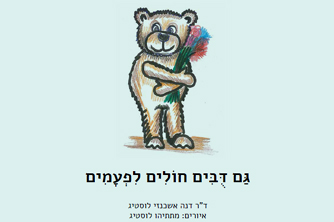page content
Skip page content“Sometimes Bears Get Sick Too”
| Each year, scores of children of all ages, some still toddlers, undergo bone marrow transplantation (BMT) in the Department of Hematology-Oncology at Schneider Children’s. “Sometimes Bears Get Sick Too” - a children’s book written by Dr. Dana Ashkenazi-Lustig, a doctor in the Hemato-Oncology Department at Schneider Children’s - was recently published to help explain the process of BMT to children and their parents. The book is in easy-to-read, simple and clear Hebrew and suitable for young children. It tells the story of a small bear with cancer who needs a transplant and the stages of care including its influence on daily life. The aim is to alleviate the burden on parents in explaining the processes in a way that the child can understand. |
Bone marrow transplants are performed in children with leukemia where conventional chemotherapy has proved insufficient or where the disease has recurred. BMT helps children with immunosuppressive diseases or other disorders of the bone marrow that do not respond to standard treatment. The process is long and complex with many hidden stages, from the meticulous search for a suitable donor in Israel or abroad and recruitment of the donor, to actual harvesting the bone marrow.
Preparing the child for a transplant includes intensive chemotherapy in the BMT Unit, during which all the child’s cells in the bone marrow (both healthy and diseased) are destroyed prior to the transplant. The new cells are intended to replace the diseased bone marrow with disease-free healthy bone marrow. Hospitalization in the Unit is prolonged and challenging with much waiting, and the onset of various side-effects such as fever, mouth sores, lack of appetite, and so on. Due to the intensity of the treatment and concealed dangers in preparing for the transplant, children are required to remain in total isolation, in a room with their parents or only two adult visitors.
Dr. Ashkenazi-Lustig said about the book, “the need for a transplant is difficult both for the child and the parents and in our experience in the BMT Unit, we found that parents themselves need guidance in understanding and being able to explain the process to their sick child as well as their healthy children at home. Reading a book to a child promotes a close bond between parent and child, and this book simplifies the information allowing for the child’s questions about the process they are about to undergo.”
The charming book was written with the encouragement of Prof. Isaac Yaniv, former director of the Hemato-Oncology Department at Schneider Children’s, who backed the idea and endorsed input from the department’s psychological and social services headed by Michal Adiri and Anat Klein respectively, as well as insight from the team in the BMT Unit headed by Dr. Jerry Stein, head of social services Hadas Halamish, and Anat Yahel, BMT coordinator.
Through the support of the “Chaim” non-profit, the book will be distributed free to all children of appropriate age who are due to undergo a BMT in any hospital in Israel. The “Chaim” charity for children with cancer in Israel was founded 34 years ago and is active in all pediatric oncology departments in hospitals around the country. The organization is committed to saving lives - by saving one child, an entire family is saved - and works towards improvement in cure rates among children with cancer and supports the needs of doctors. The management of “Chaim” is comprised entirely of volunteers, without any paid CEO.





.jpg?BannerID=98)



.jpg?BannerID=97)

.jpg?BannerID=96)